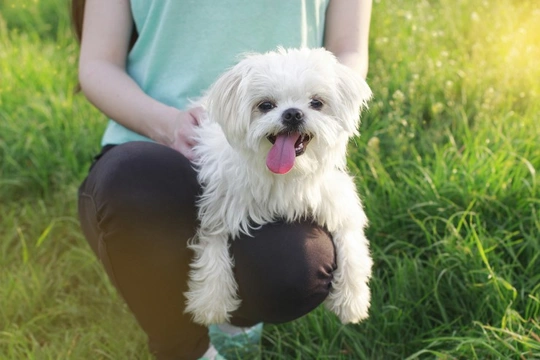
Maltese Dogs - Reverse Sneezing and Collapse Tracheas
If you are thinking about sharing your home with a Maltese dog, whether you hope to get a puppy or adopt an older dog, one of the things you need to be prepared for is the very strange noises these charming dogs often make which can sound like they are having real trouble breathing! In fact, it's a condition that's more commonly known and referred to as reverse breathing"".
Maltese dogs have a tendency to do this when they are ultra-excited about something or they can do it when they've finished eating their food or having just taken a drink of water. Some of the breed ""reverse breath"" after they've been running around whether it's in the back garden or out in the park. Some dogs even do it when they pull on their leads.
The reason it occurs is because their pharynx rubs up against their throat which then causes it to go into spasms. These spasms calm down once a dog manages to take a couple of swallows. However, some Maltese dogs need to be taken outside so they can get a few breaths of fresh air which generally helps calm their snorting and wheezing down so their breathing goes back to normal and it typically does so pretty quickly.
Is Reverse Sneezing a Dangerous Condition?
Reverse sneezing is not seen by vets as a serious medical condition that needs veterinary intervention. However, there is another condition that is extremely serious that is often confused with reversed sneezing which is when a dog's trachea collapses. This is a condition that needs immediate veterinary attention because if a dog's windpipe collapses, it means they can have real trouble breathing.
What Causes a Dog's Windpipe to Collapse
Vets are not sure why this happens or how the problem first develops, but the one thing they are certain of is that dogs like the Maltesethat have a defect in the chemical composition of their tracheal rings which basically means their windpipes are more prone to collapsing. Other breeds most affected by the condition include the following:
- Chihuahuas
- Shih Tzus
- Pomeranians
- Toy Poodles
- Lhasa Apsos
- Yorkshire Terriers
Vets also think the condition is a genetic health disorder that can be passed from parent dogs to their puppies. As such, if you are thinking about getting a Maltese puppy, it's very important to contact reputable breeders who only use healthy dogs known not to suffer from collapsed tracheas in any of their breeding programmes.
Signs to Watch Out For
One of the more common signs of there being a problem is when a dog starts constantly coughing. The cough can only be described as being harsh, dry and quite painful sounding. Vets often refer to this type of cough as ""honking"" which is much like the sound a goose makes. Dogs with a collapsed trachea tend to cough a lot during the day, but less at night and when they get excited, it can trigger the cough too.
Telling the Difference Between a Collapsed Trachea and Reverse Sneezing
If your dog's cough sounds very rough and dry, your best course of action is to get them to the vet so their throats can be thoroughly examined. More often than not as soon as the vet applies even a little pressure on a Maltese Terrier's throat, it's enough for them to establish their trachea has indeed collapsed. With this said, a vet would still carry out other tests to confirm whether or not a dog is suffering from the condition and they would typically take x-rays which in itself can prove rather challenging.
Vets often use an endoscope to establish to what extent a dog's windpipe has collapsed which tends to be a more effective way of establishing whether a dog is suffering from the condition. The reason being it allows them to watch a dog's breathing which in short means they get to witness things as they happen. The bad news is that if your Maltese Terrier is diagnosed as suffering from a collapsed trachea, the chances are they may also have developed a heart disorder. As such, a vet would also need to run some tests to establish the condition of your pet's heart and then recommend a treatment should they think it necessary.
Treating a Collapsed Trachea
The vet would be able to treat your dog's collapsed windpipe either surgically or through medication. The success rate is very good when treating the condition with anti-inflammatory drugs. Dogs with a collapsed trachea have also been seen to respond very well to bronchodilators which are specifically formulated for use on dogs suffering from airway issues that affects their breathing. Dogs are also typically prescribed a course of antibiotics as a way of preventing a secondary infection from taking hold which could end up dramatically complicating things and making it harder to treat.
Obese Dogs Are More at Risk
If your Malteseis carrying too much weight, they could be at greater risk of developing a collapsed trachea. The reason being that more strain and stress is put on their breathing which results in the rings found in their windpipes failing. The other thing to bear in mind, is that once a Malty has suffered from the condition, they are more at risk of it happening again in the future which means keeping a watchful eye on your dog is essential.
If your dog does not respond to any treatments, the vet might suggest surgery, but this would depend on the severity of the condition and the parts of the windpipe that have been affected.
""



